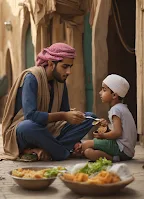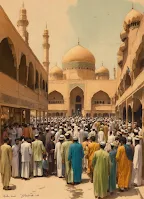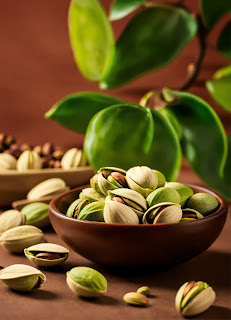THE SIGNIFICANCE OF EID UL ADHA
Eid-ul-Adha: A Festival of Divine Devotion and Human Kindness
Eid-ul-Adha, also known as the "Festival of Sacrifice" or "Bakra eid," is one of the most significant and sacred festivals in Islam. Celebrated with immense joy and religious devotion by Muslims worldwide, this festival commemorates the profound faith and willingness to sacrifice demonstrated by Prophet Ibrahim (Abraham) in obedience to Allah's command. Eid-ul-Adha not only honors this act of unwavering devotion but also embodies the values of unity, charity, and spiritual renewal.
Historical and Religious Background of Eid-ul-Adha
The story of Eid-ul-Adha is deeply rooted in the narrative of Prophet Ibrahim (Abraham), a revered figure in Islam, Judaism, and Christianity. According to Islamic tradition, Allah commanded Ibrahim to sacrifice his beloved son, Ismail (Ishmael), as a test of his faith and obedience. Despite the immense personal anguish, Ibrahim prepared to fulfill Allah's command,
demonstrating his absolute submission and trust in God’s will. Just as Ibrahim was about to perform the sacrifice, Allah, pleased with Ibrahim’s unwavering devotion, provided a ram to be sacrificed instead of Ismail. This act of divine intervention underscored the importance of faith, submission, and divine mercy. Eid-ul-Adha commemorates this event, celebrating Ibrahim's faith and the merciful provision of Allah.The Connection Between Hajj and Eid-ul-Adha
Eid-ul-Adha is closely associated with the Hajj, the annual pilgrimage to Mecca, which is one of the Five Pillars of Islam. Celebrated on the 10th day of Dhu al-Hijjah, the last month of the Islamic lunar calendar, Eid-ul-Adha marks the culmination of the Hajj
rituals. Pilgrims in Mecca perform the sacrifice, mirroring Ibrahim's act, and Muslims around the world participate in similar sacrifices, reinforcing the sense of global unity and shared religious heritage.Religious Significance of Eid-ul-Adha
Unwavering Faith in Allah: At the heart of Eid-ul-Adha lies the lesson of unwavering faith and submission to Allah. The story of Ibrahim and Ismail highlights the importance of trusting and obeying Allah’s
Community Unity and Charity: Eid-ul-Adha emphasizes community unity and the spirit of giving. After the sacrificial rituals, the meat is divided into three parts: one for the family, one for friends and neighbors, and one for the less fortunate. This practice embodies the principles of goodwill, social
responsibility, and compassion. It encourages Muslims to share their blessings and to support those in need, fostering a sense of community and mutual support.Spiritual Renewal and Purification: Eid-ul-Adha also symbolizes spiritual renewal and purification. The act of sacrifice is not just a physical offering but also a means of seeking spiritual cleansing and a renewed commitment to righteous living. It reminds Muslims of the importance of self-sacrifice, moral integrity, and the pursuit of spiritual excellence.
Cultural and Social Significance Eid-ul-Adha
Family and Community Celebrations: Eid-ul-Adha is a significant occasion for family and community gatherings. It is a time when families come together to celebrate, share meals, and exchange greetings. Traditional
dishes are prepared, new clothes are worn, and homes are decorated, reflecting the joy and festivity of the occasion. This festival not only strengthens familial bonds but also reinforces the social fabric of the Muslim community.Observance of Traditions and Customs: The observance of various traditions and customs is central to the celebration of Eid-ul-Adha. These include performing the special Eid prayer (Salat al-Eid), conducting the sacrificial act (Qurbani), and extending help to the less fortunate.
Through these rituals, Eid-ul-Adha provides an opportunity to preserve and pass down cultural and religious heritage from generation to generation.Symbol of Equality and Inclusiveness: Eid-ul-Adha is a festival that symbolizes equality and inclusiveness. The distribution of sacrificial meat ensures that everyone, regardless of their economic status,
participates in the joy of the festival. This practice promotes social equality and bridges gaps within the community, reinforcing the Islamic principle that all individuals are equal in the eyes of Allah.Modern Relevance of Eid-ul-Adha
Unity in the Global Muslim Community: In today’s world, where Muslims are dispersed across various countries and cultures, Eid-ul-Adha serves as a powerful symbol of
global unity. Despite their geographical and cultural differences, Muslims are united by their shared beliefs and values. Eid-ul-Adha reinforces this sense of solidarity and strengthens the bonds within the global Muslim community.Values of Sacrifice and Service in Modern Life: In an age where materialism and individualism are on the rise, Eid-ul-Adha highlights the enduring values of sacrifice and service. It teaches that true fulfillment and peace come not from self-centered
pursuits but from serving others and making sacrifices for the greater good. The festival’s message encourages Muslims to be mindful of their responsibilities towards others and to act with generosity and compassion.Economical Significance of Eid-ul-Adha
Eid-ul-Adha, also known as the "Festival of Sacrifice," has significant economic implications on multiple levels. The festival stimulates the livestock market, as millions of Muslims worldwide purchase animals for sacrifice, leading to a surge in trade activities in the agricultural and livestock sectors. This not only benefits farmers and traders but also boosts the entire supply chain associated with animal husbandry.
Additionally, the tradition of distributing the sacrificial meat to the poor and needy promotes social welfare and redistribution of wealth, ensuring that even the less fortunate partake in the festivities. Moreover, Eid-ul-Adha drives consumer spending on clothing, food, and gifts, invigorating local and global economies. From increased market activity in livestock to heightened consumer spending, Eid-ul-Adha plays a vital role in fostering economic growth and supporting community well-being.The Holistic Significance of Eid-ul-Adha
Eid-ul-Adha, or Bakra eid, holds deep significance on multiple levels. It is a celebration of unwavering faith, a reaffirmation of community unity and charity, and a call to spiritual renewal. Through the rituals and traditions associated with this festival, Muslims honor their religious heritage and strengthen their ties with family, community, and the global Muslim Ummah. In modern times, Eid-ul-Adha continues to be relevant as it upholds values that are timeless and universal. By observing this festival, Muslims are reminded of the importance of faith, sacrifice, and service. They are encouraged to live with integrity, to support their communities, and to seek spiritual growth and renewal.
Eid-ul-Adha is not merely a festival of personal devotion but also a celebration that promotes peace, unity, and equality within society. It offers a chance to reflect on life’s true values and to strive towards a more just and compassionate world.
Thanks for reading,
Have a nice day. 😊
.jpg)
.jpg)














Comments
Post a Comment